First Day: Crack Climbing in Moab
Travel Log: 20 March 2012
To fully enjoy the next several stories, here's my version of rock climbing definitions for you. I am not an expert on climbing by any stretch, but here's my take on the terms from my limited experience:
Bouldering - Climbing on rocks without harnesses or ropes, though the climber usually uses climbing shoes and chalk. Usually up only short distances and has a bouldering mat below the climber for the climber to fall on.
Top Roping - A rope that has been placed through an anchor at the top (either through a lead climber or because you're at a climbing gym) and has a belayer on one end and a climber on the other. (Some people call this bottom roping, since the belayer is on the bottom, but tomato - tomato.)
Belayer - The person whose job it is to keep the climber safe by using an ATC or Grigri. When belaying a lead climber, they are tied directly to the lead climber. When top roping, their rope goes up to the top anchor and then back down to the climber.
Lead Climber - The person who goes up a route first. They take the most risk by being exposed between placing protective gear, whether quickdraws or cams/nuts. If they fall, it is the distance from them to their last place of gear and whatever force pulls up on their belayer. Once to the top of the route, they tie into the top anchor and create a top rope for others to climb up the same route but without having to place gear.
Sport Climbing - Climbing on rocks with a harness, rope, climbing shoes, and chalk. Sport climbing means that there are strong bolts pre-set into the rock that the lead climber can clip into with quickdraws.
Trad(itional) Climbing - Climbing on rocks with a harness, rope, climbing shoes, and chalk. Trad climbing means that the lead climber places their own gears, cams or nuts, into the rock that will hold/protect the them should they fall. It requires more knowledge of what type of rock you are climbing on as well as knowing how to set the cams securely into the cracks. There is sometimes an actual bolt for the top anchor on trad routes, but not always.
Crack Climbing - Trad or sport climbing that ascends cracks and uses specialized techniques, such as jamming, laybacking, or stemming.
Slab Climbing - Trad or sport climbing where the rock face is less than vertical and climber uses friction and balance with very small holds.
Climbing Scales - Class 1 is walking/hiking, Class 2 is climbing using little hands, Class 3 is scrambling using hands and increased exposure, Class 4 is climbing with definite exposure, maybe a rope and falls may be fatal, Class 5 is technical free climbing involving a rope & belayer and falls may be fatal. Within Class 5, there are ratings of 5.1, 5.2, up to 5.15, that help potential lead climbers and top ropers to gauge the technical ability required. (For reference, 5.14 and 5.15 are very rare. I believe there are only 2 - 5.15 routes in the world currently.)
Phew! Clear as mud! :)!
Would you belive today was going to be our boys' first day climbing outdoors ever?! What an introduction! Crack climbing at Indian Creek Canyon just south of Moab! Indian Creek is world reknown for its crack climbing but is also amazingly beautiful with its red and taupe canyons and serving as a gateway into the Canyonlands Needles District. Our destination within Indian Creek would be Donnelly Canyon. (The below photo was taken at the end of our day, but on it you can see the vertical cracks that were our picture perfect playground.)

Whenever we are hiking and I am glancing upon a rock formation in the distance, it is difficult for me to judge the height. As I sit here typing, I am staring at the sun setting on majestic Lumpy Ridge in Rocky Mountain National Park. The base looks within reach but I know it is 2 miles from where I sit. The rock faces look like a few hundred feet tall but I know in reality it is well over a thousand feet higher than where I sit. (Maybe I'll have to try to fill out this math worksheet for future practice, :)!)
The same experience can be true when in the canyons of Utah. Some, like the actual Canyonlands National Park, the canyon walls are 2000 feet in height, but here in Donnelly Canyon, those beautiful wingate sandstone canyon walls are around only 250' above you and from the parking lot the routes are within sight making the car to base a nice distance for all ages. Add in a morning chill, and it was a perfect morning hike.
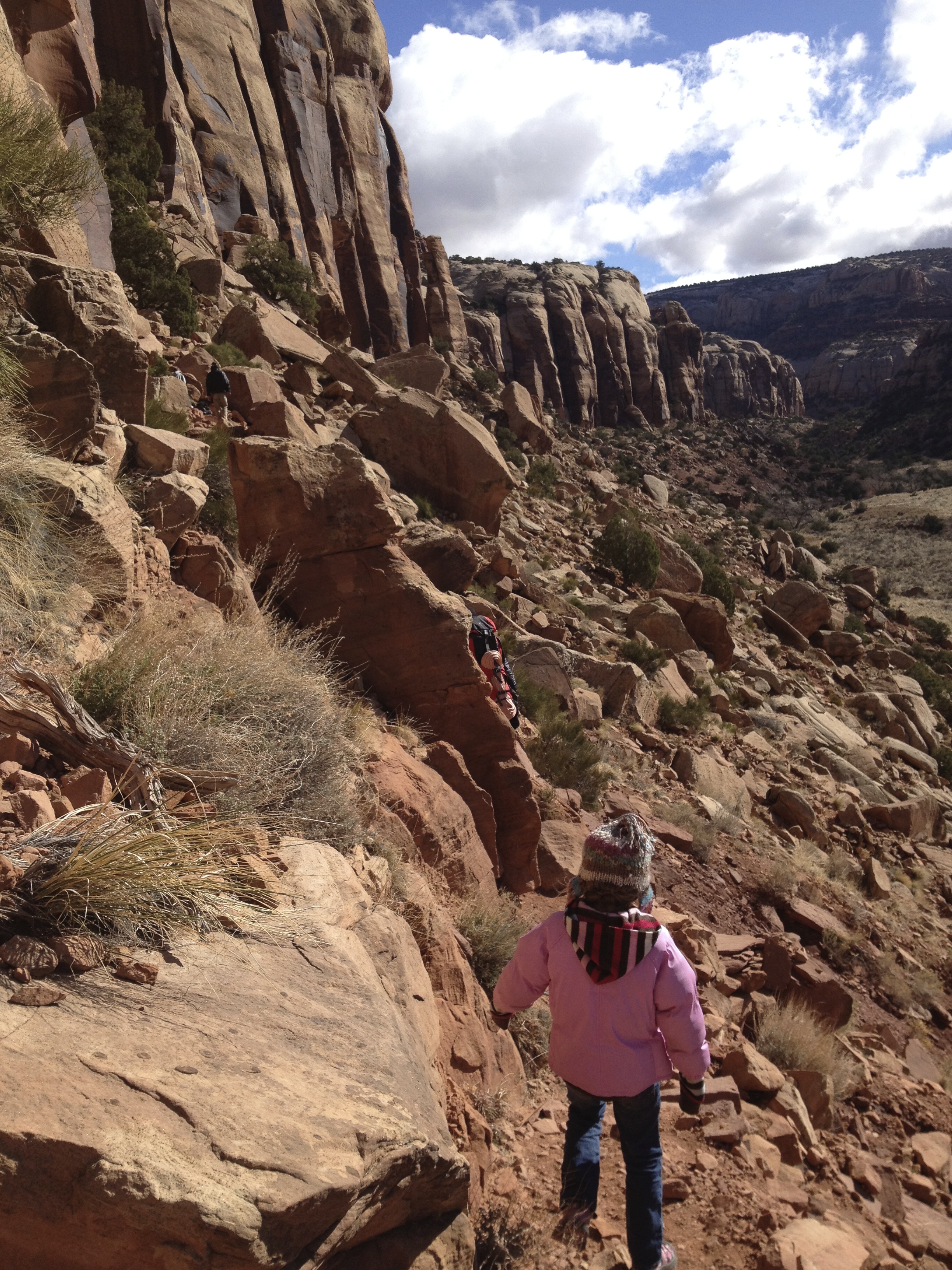
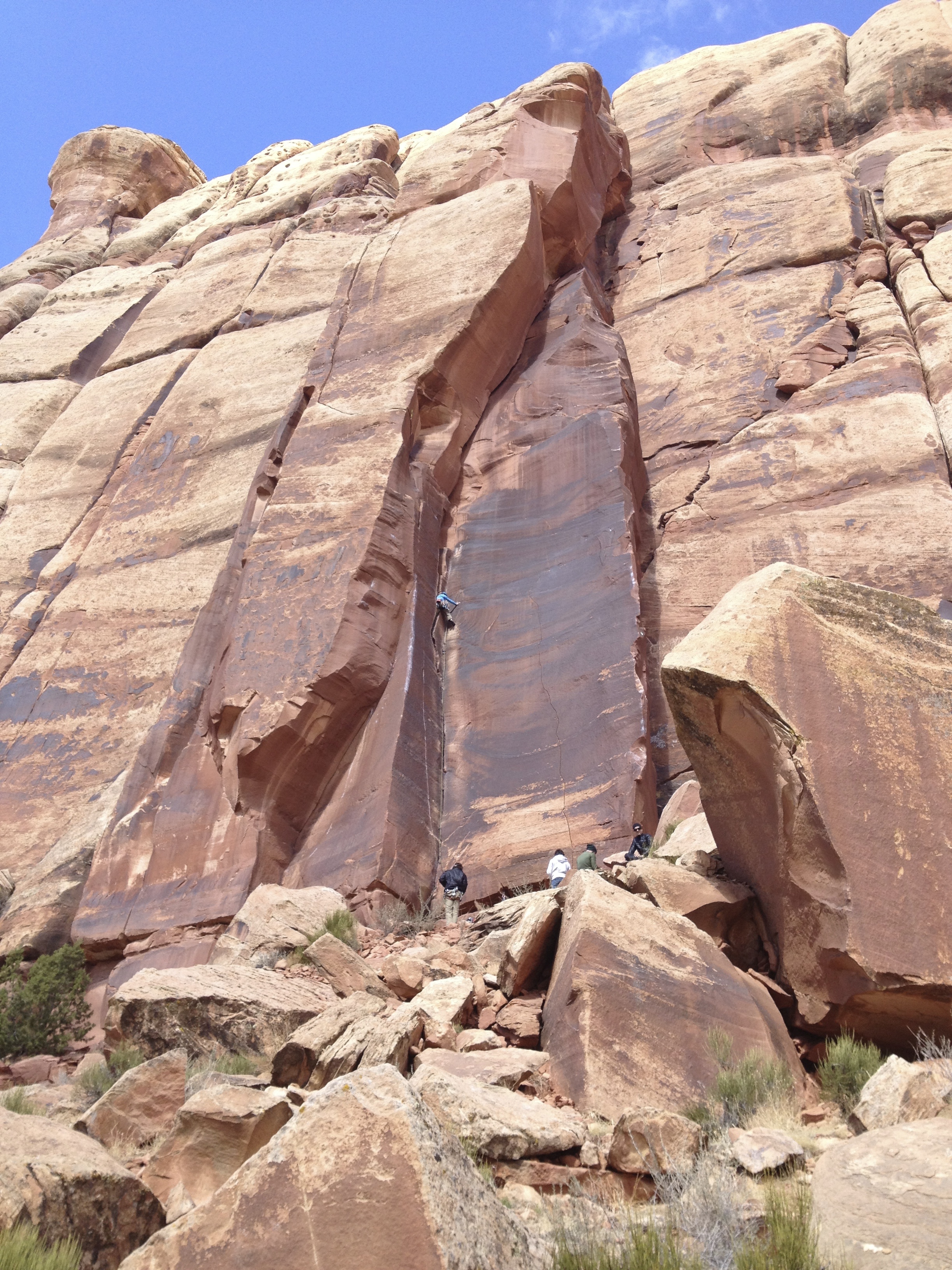
Our friends who came to Moab with us are all amazing climbers. Molly lead up a 5.8+ trad route, about 50' high, and called Binou's Crack and set up a top rope for everyone else. (Every route has some sort of name to help distinguish it from others. Sometimes the climbers who name them are creative and other times they are just lazy, as you'll see later.) It was on this crack that both our boys got to climb outdoors and learn how to use technical hand and foot jams for crack climbing. Unlike the jugs they could grab onto in the climbing gym, here they had to make shapes with their hands, jam them into the cracks, then widen their hands, and trust that to hold them. Or they had to jam their fingers into the crack and lay back on their outstretched arms, while walking along up the wall with both hands and feet. Crack climbing is something else, but OH, so much fun!
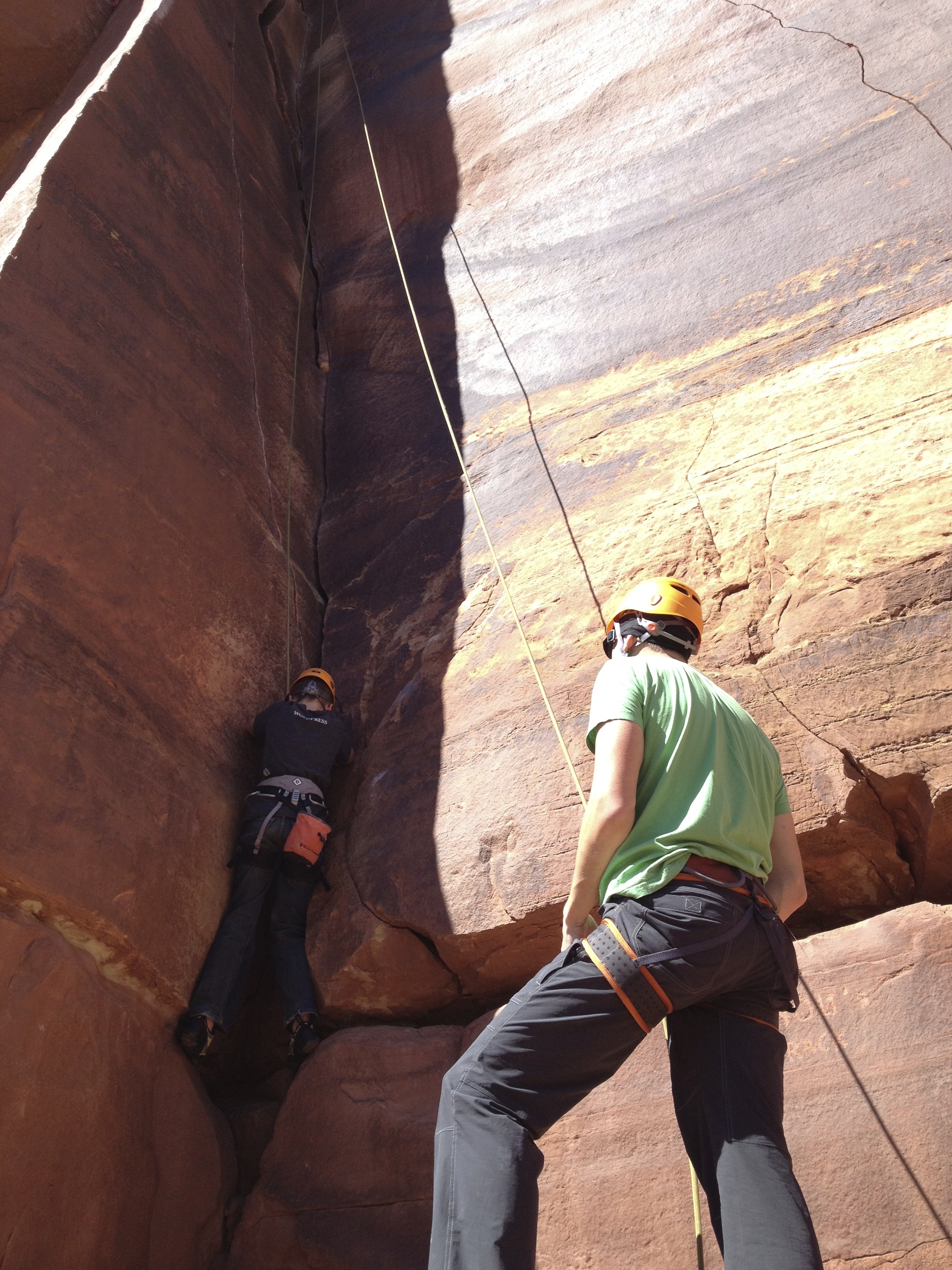
Zeke getting the hang of the new techniques.
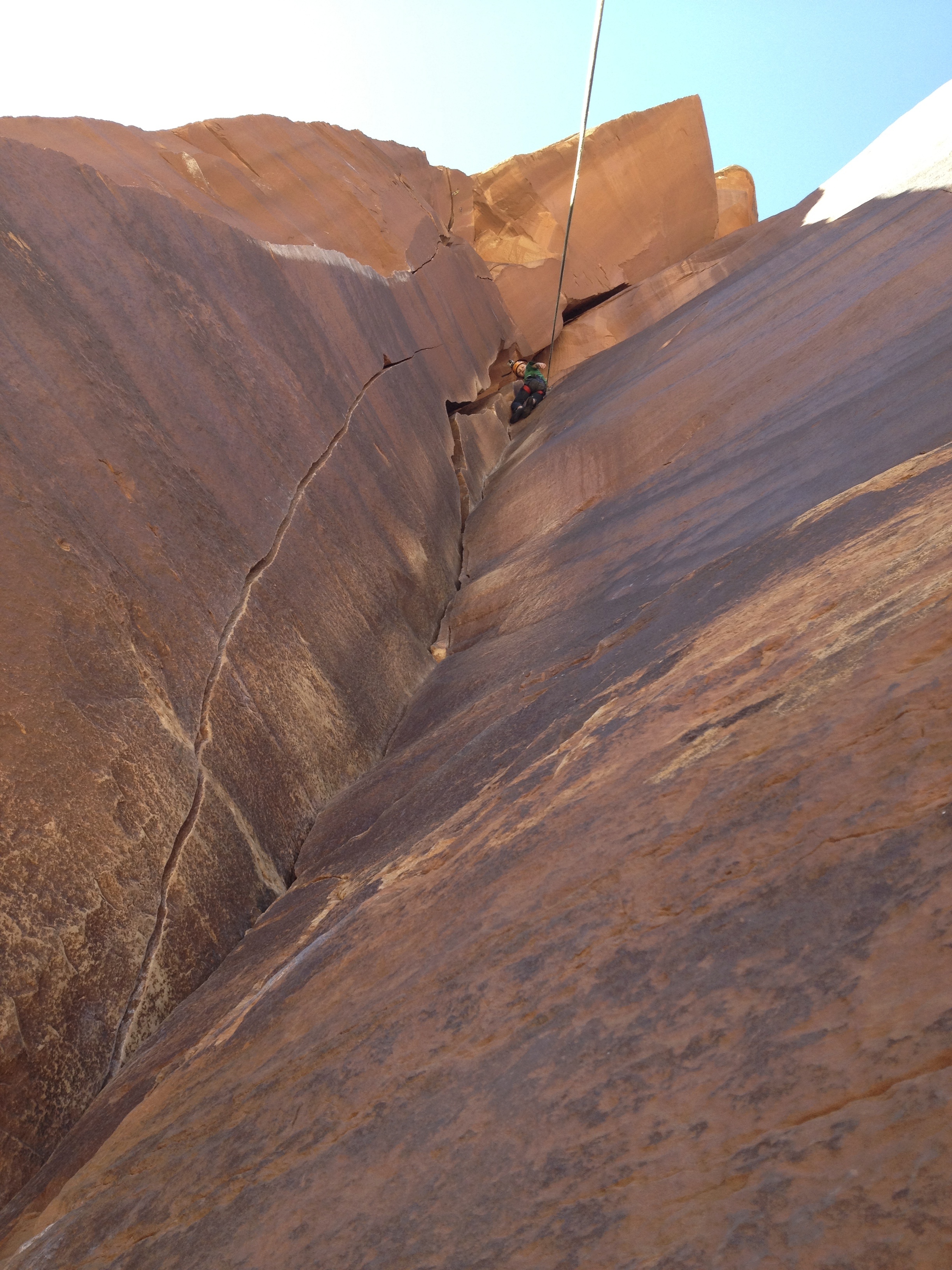
Max to the top!
Amos lead up a 5.10+ trad route, about 110' high, called Unknown Pod Climb. (See, where was their creativity on this one?!) This was a long, hard lead climb, and Amos was amazing at tackling it. He was kind enough to top rope it and let another family friend, Isaac, and me climb it, before he had to climb it again to clean the route. Sometimes when climbing where it is incredibly difficult, I feel guilty about taking f o r e v e r. This was one of those situations. It felt like it took a minute to simply move an inch though the crux, a crazy pea pod shape into the crack. (In the photo below, it's near the dark area toward the bottom of the crack, which is actually about 30' up from the base.) But the joy I felt upon completing this route was unmatched and I wore my bloody, mangled hands with pride.
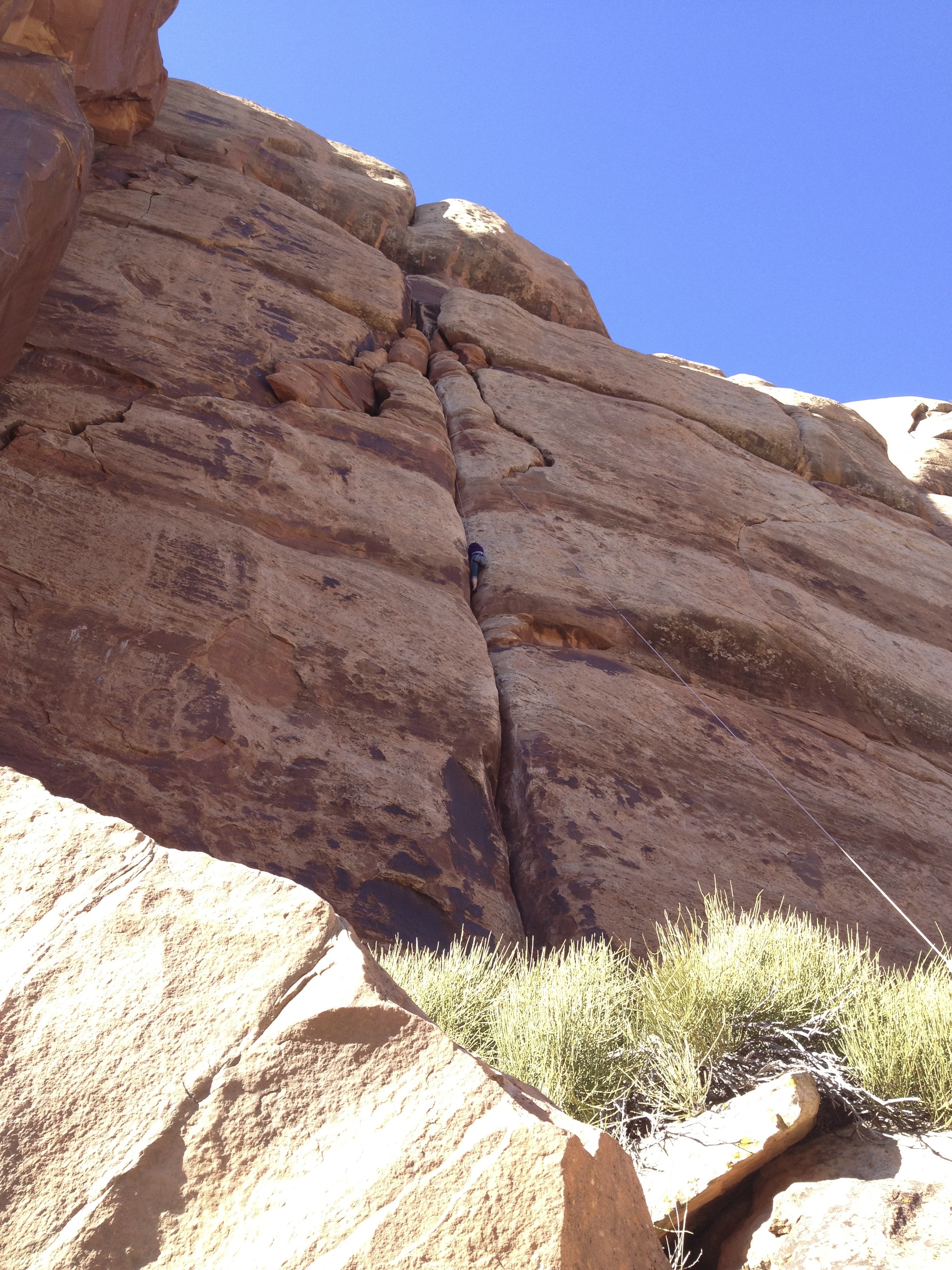
We spent an entire day on this beautiful wall, with the most perfect views, playing in its boulder field, bloody-ing our hands, and chasing lizards. It ended up being a great place for kids to come with not only for the short hike to the base and the manageable routes for kids, but also for the "safe" play area around us. We ended our day feasting on Triscuits and Kipper Snacks before making the hour long drive back to our Moab home.



Response to First Day: Crack Climbing in Moab